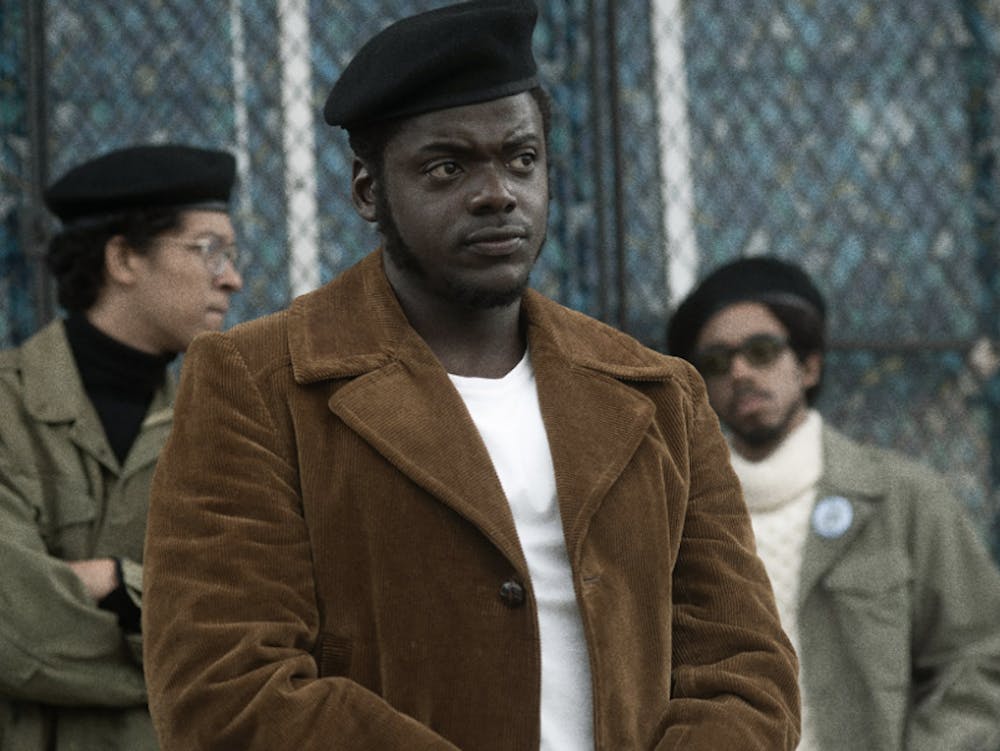“I am a revolutionary.” Those were Fred Hampton’s words when he was released from prison in August of 1969. Hampton, who was Vice Chairman of the Illinois Black Panther Party, had been held on charges of stealing $71 of ice cream. On Dec. 4, 1969, he was assassinated by the FBI and local law enforcement, aided by their informant within the Panthers, William O’Neal.
“Judas and the Black Messiah,” directed by Shaka King and co-produced by “Fruitvale Station” and “Black Panther” director Ryan Coogler, tells the story of Hampton’s movement and the racially-motivated plots of FBI director J. Edgar Hoover to prevent Hampton from ascending as a “Black Messiah.”
Hampton, portrayed by Daniel Kaluuya, oozes charisma throughout the film. He inspires people to come together and challenge the “pigs” (the bourgeoisie) that are hoarding resources while poor people suffer under unjust laws and unequal treatment. Hampton was not a Black Nationalist: rather, he was a revolutionary socialist. In 1960s America, he managed to unite the Young Lords (a group of radical Puerto Ricans), the Crowns (a local Chicago gang) and the Young Patriots (poor and militant white people) into a Rainbow Coalition aimed at defeating “this racist, fascist and nefarious U.S. government.” Under Hampton’s leadership, the Panthers created education centers and fed “3000 kids a week” in Chicago. Hampton was serving the poor and challenging the status quo of the time.
O’Neal, portrayed by LaKeith Stanfield, was 18 in 1968 when FBI agent Roy Mitchell (Jesse Plemons) instructed him to infiltrate the Black Panther Party. O’Neal gradually implanted himself in the party, eventually becoming Chief of Security, all the while having fancy dinners with and pocketing cash payments from Mitchell. In late 1969, Mitchell approached O’Neal, who drew blueprints of Hampton’s apartment which were instrumental in his assassination.
Kaluuya and Stanfield shine in their roles, with Kaluuya delivering passionate speeches that grab the viewer and motivate them to “fight the pigs,” while Stanfield’s nervous energy and internal conflicts are palpable throughout the film. However, perhaps due to the limitations of film and acting in general, it is difficult to convey how young each character truly was. At his death, Hampton was 21 while O’Neal was still a teenager at the time; Kaluuya and Stanfield are both around 30. King’s direction is tense and arresting, with real excerpts of O’Neal’s interviews for “Eyes on the Prize.” The viewer knows how the story will end, despite a few creative liberties taken (especially with the characterization of O’Neal). As the film neared its dramatic conclusion, I could not shake my unmistakable dread for the coming assassination of Hampton, as the film accelerated to the climatic moment.
King succeeds in portraying the nuances of Hampton and the Panthers at large. On occasion, Hampton called for violence towards “the pigs,” yet he also was quick to back down when some of his more zealous comrades plotted to attack the Chicago City Hall. Also gripping is King’s depiction of COINTELPRO, the FBI program with intent “to ‘disrupt, misdirect, discredit or otherwise neutralize’ militant groups” according to Jeffrey Haas, an attorney with the Panthers. In the film, we see Hoover’s paranoia that his segregated and hateful worldview may come crashing down should Hampton have his way. In one particular scene, he coerces Agent Mitchell into moving to set up Hampton’s assassination through fear tactics of “what might happen to your family should the Panthers have their way.”
There are stark similarities between COINTELPRO of the film and the present-day government programs that target civil rights groups as terrorists, while refusing to admit the wrongdoings of radical white nationalists. When the Black Lives Matter movement rose to national prominence in 2014, the FBI immediately moved to place informants within the organization. In 2017, just weeks before white supremacists marched in Charlottesville, Virginia, the FBI labelled certain Black activists as “national security threats.” Even more recently, the treatment of the white extremists that stormed the Capitol on Jan. 6 further proves the grave threat they pose towards America, even though policing is still disproportionately aimed at curtailing BIPOC activists who seek to uplift marginalized communities.
Ultimately, the messages of “Judas and the Black Messiah” are just as important to contemporary America as Hampton’s messages to Chicago in 1969. The war on inequality and white supremacy still rages on over 50 years later, and through cultural pieces like “Judas,” I hope that more people will come to realize that if we want change, we must all be revolutionaries.
Get The Chronicle straight to your inbox
Sign up for our weekly newsletter. Cancel at any time.

